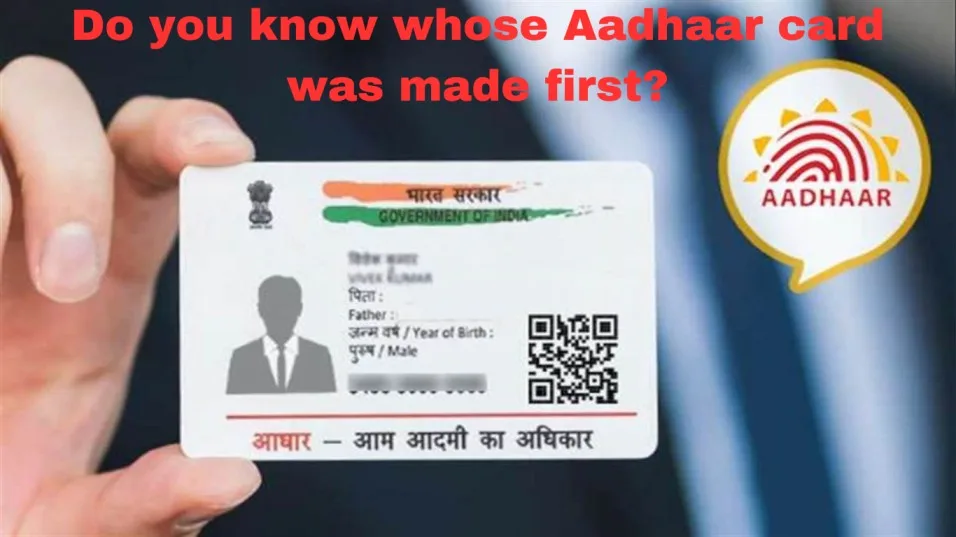Introduction
The Aadhar Card, a unique identification number issued by the Indian government, has become an essential document for residents of India. It serves as proof of identity and address, facilitating various governmental and private transactions. However, behind this ubiquitous card lies an intriguing history, including the identity of the first individual to receive it.
History of Aadhar Card
The Aadhar Card project was initiated in 2009 with the aim of providing a unique identification number to every resident of India. The concept was to create a centralized database that would streamline the delivery of welfare services and prevent identity fraud. After several years of planning and development, the Aadhar Card enrollment process began in 2010.
First Aadhar Card Holder
The honor of being the first individual to receive an Aadhar Card goes to Ranjana Sonawane, a resident of Maharashtra. On September 29, 2010, she was officially handed the Aadhar Card bearing the unique identification number 100000000000 . This milestone marked the beginning of a new era in India’s identity management system.
Creation of Aadhar Card
The process of obtaining an Aadhar Card involves visiting an Aadhar enrollment center and providing biometric and demographic information.
This includes fingerprints, iris scans, and personal details such as name, age, and address. Once verified, the Aadhar Card is generated and dispatched to the applicant’s address.
Benefits of Aadhar Card
The Aadhar Card serves as a crucial document for availing various government services and subsidies. It simplifies the process of identification and authentication, reducing paperwork and bureaucratic hurdles. Additionally, it promotes financial inclusion by enabling access to banking services and direct benefit transfers.
Challenges and Controversies
Despite its widespread adoption, the Aadhar Card has faced criticism on several fronts. Privacy advocates raise concerns about the centralized collection of biometric data and the potential for misuse. Security breaches have also been reported, highlighting the need for robust safeguards and oversight.
Impact of Aadhar Card
The Aadhar Card has had a profound impact on India’s socio-economic landscape. It has facilitated the efficient delivery of welfare programs, reduced leakages and corruption, and enhanced transparency in governance. Moreover, it has paved the way for India’s transition to a digital economy, promoting e-governance and digital transactions.
Digital India
As part of the Digital India initiative, the Aadhar Card has been integrated into various digital platforms and services. It serves as a key enabler of online authentication and verification, facilitating e-signatures, eKYC processes, and digital payments. This integration has accelerated India’s digital transformation and fostered innovation in financial services and e-commerce.
Global Recognition
The success of the Aadhar Card project has garnered interest from other countries seeking to implement similar identification systems. India has collaborated with international organizations and governments to share its expertise and best practices in identity management. This global recognition reaffirms India’s position as a leader in the field of digital identity.
Future Prospects
Looking ahead, the Aadhar Card ecosystem is poised for further expansion and innovation. With advancements in technology such as biometrics and artificial intelligence, the Aadhar platform can evolve to offer more sophisticated services and functionalities. Additionally, efforts to address privacy concerns and enhance data security will be paramount in ensuring the continued success and acceptance of the Aadhar Card.
Critiques and Debates
Despite its many benefits, the Aadhar Card continues to face criticism and debate. Opponents argue that it infringes on individual privacy rights and creates potential security risks. Calls for greater transparency and accountability in the Aadhar ecosystem have led to ongoing legal battles and policy discussions.
Public Perception
The public perception of the Aadhar Card varies widely, with opinions ranging from staunch support to vehement opposition. While some view it as a revolutionary tool for empowerment and inclusion, others raise valid concerns about its implications for privacy and civil liberties. Public awareness campaigns and educational initiatives play a crucial role in fostering informed discourse and addressing misconceptions surrounding the Aadhar Card.
Government Initiatives
The government has undertaken various initiatives to promote Aadhar enrollment and usage. This includes door-to-door enrollment drives, Aadhar camps in rural areas, and partnerships with banks and other institutions to integrate Aadhar-based services. These efforts aim to ensure maximum coverage and accessibility of the Aadhar Card across all segments of society.
Financial Inclusion
An impactful advantage of the Aadhar Card lies in its ability to foster greater financial accessibility and inclusivity. By providing a unique identification number linked to a bank account, the Aadhar Card enables individuals to access banking services and government subsidies more easily. This has helped reduce the prevalence of cash-based transactions and informal economies, contributing to India’s economic development.
Conclusion
In conclusion, the Aadhar Card represents a landmark achievement in India’s quest for universal identity and inclusion. From its humble beginnings to its widespread adoption, it has transformed the way individuals interact with the government and access essential services. While challenges remain, the Aadhar Card continues to evolve and adapt to meet the needs of a rapidly digitizing society.
FAQs
Is the Aadhar Card mandatory for all Indian residents?
While Aadhar enrollment is voluntary, it is increasingly required for accessing government services and subsidies.
Can non-residents of India obtain an Aadhar Card?
No, Aadhar Cards are issued only to residents of India.
What steps should I take if there’s an error on my Aadhar Card?
You can update your Aadhar details online or visit the nearest Aadhar enrollment center for assistance.
Is the Aadhar Card linked to my bank account?
Yes, you can link your Aadhar Card to your bank account for easier access to financial services and subsidies.
What level of security safeguards my biometric data within the Aadhar database?
The Unique Identification Authority of India (UIDAI) employs stringent security measures to protect biometric data from unauthorized access or misuse.

